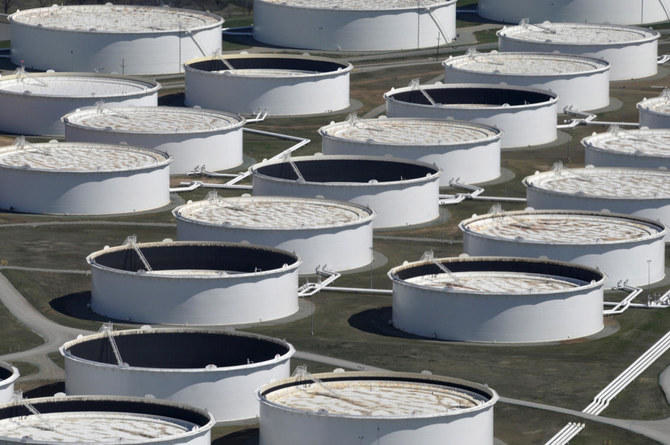SINGAPORE: Oil prices rebounded more than $1 on Monday after the US House of Representatives passed a huge stimulus package, although a drop in China’s February factory activity growth capped gains.
Brent crude futures for May rose $1.07, or 1.7 percent, to $65.49 per barrel by 0410 GMT. The April contract expired on Friday.
US West Texas Intermediate (WTI) crude futures jumped $1.01, or 1.6 percent, to $62.51 a barrel.
Front-month prices for both contracts touched 13-month highs last week, slipping back on Friday along with wider financial markets following a bond rout amid inflation fears.
“Oil prices are recovering this morning in line with most risk assets on the back of the US stimulus bill passing the House,” Stephen Innes, chief global markets strategist at Axi, wrote in a note on Monday.
The US House passed a $1.9 trillion coronavirus relief package early on Saturday, lifting investors’ risk appetite and Asian stock markets. The package will now move to the US Senate for further deliberation.
The approval of Johnson & Johnson’s COVID-19 shot also buoyed the economic outlook.
Manufacturing data from top Asian oil importers were mixed, however, as China’s factory activity growth slipped to a nine-month low in February, while manufacturing in Japan expanded the fastest in more than two years.
Crude supplies going into top importer China are expected to ease in the second quarter as the oil price rally cooled demand. Preliminary data also showed that South Korea’s February imports are down 14.7 percent from a year earlier.
The Organization of the Petroleum Exporting Countries (OPEC) and its allies, a group known as OPEC+, will meet on Thursday and could discuss allowing as much as 1.5 million barrels per day of crude back in the market.
“We think if the combined (OPEC+) increase does not exceed 500,000 bpd, that will be bullish for prices,” analysts at Singapore’s OCBC bank said.
Separately, Iran on Sunday dismissed opening talks with the United States and the European Union to revive the 2015 nuclear deal, insisting Washington must first lift the unilateral sanctions that have sharply reduced Iranian oil exports.
Oil prices rebound as US House passes huge stimulus bill
https://arab.news/7mypg
Oil prices rebound as US House passes huge stimulus bill

- OPEC+ will meet on Thursday to potentially discuss allowing as much as 1.5 million barrels per day of crude back in the market
- The US House passed a $1.9 trillion coronavirus relief package early on Saturday, lifting investors’ risk appetite and Asian stock markets
Multilateralism strained, but global cooperation adapting: WEF report

DUBAI: Overall levels of international cooperation have held steady in recent years, with smaller and more innovative partnerships emerging, often at regional and cross-regional levels, according to a World Economic Forum report.
The third edition of the Global Cooperation Barometer was launched on Thursday, ahead of the WEF’s annual meeting in Davos from Jan. 19 to 23.
“The takeaway of the Global Cooperation Barometer is that while multilateralism is under real strain, cooperation is not ending, it is adapting,” Ariel Kastner, head of geopolitical agenda and communications at WEF, told Arab News.
Developed alongside McKinsey & Company, the report uses 41 metrics to track global cooperation in five areas: Trade and capital; innovation and technology; climate and natural capital; health and wellness; and peace and security.
The pace of cooperation differs across sectors, with peace and security seeing the largest decline. Cooperation weakened across every tracked metric as conflicts intensified, military spending rose and multilateral mechanisms struggled to contain crises.
By contrast, climate and nature, alongside innovation and technology, recorded the strongest increases.
Rising finance flows and global supply chains supported record deployment of clean technologies, even as progress remained insufficient to meet global targets.
Despite tighter controls, cross-border data flows, IT services and digital connectivity continued to expand, underscoring the resilience of technology cooperation amid increasing restrictions.
The report found that collaboration in critical technologies is increasingly being channeled through smaller, aligned groupings rather than broad multilateral frameworks.
This reflects a broader shift, Kastner said, highlighting the trend toward “pragmatic forms of collaboration — at the regional level or among smaller groups of countries — that advance both shared priorities and national interests.”
“In the Gulf, for example, partnerships and investments with Asia, Europe and Africa in areas such as energy, technology and infrastructure, illustrate how focused collaboration can deliver results despite broader, global headwinds,” he said.
Meanwhile, health and wellness and trade and capital remained flat.
Health outcomes have so far held up following the pandemic, but sharp declines in development assistance are placing growing strain on lower- and middle-income countries.
In trade, cooperation remained above pre-pandemic levels, with goods volumes continuing to grow, albeit at a slower pace than the global economy, while services and selected capital flows showed stronger momentum.
The report also highlights the growing role of smaller, trade-dependent economies in sustaining global cooperation through initiatives such as the Future of Investment and Trade Partnership, launched in September 2025 by the UAE, New Zealand, Singapore and Switzerland.
Looking ahead, maintaining open channels of communication will be critical, Kastner said.
“Crucially, the building block of cooperation in today’s more uncertain era is dialogue — parties can only identify areas of common ground by speaking with one another.”












